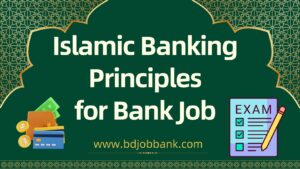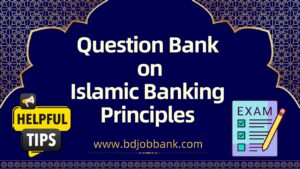Islamic Banking Products and Services in Bangladesh
Islamic Banking Products and Services in Bangladesh for Bank Job Preparation
Islamic banking, also known as Islami banking, is an alternative financial system that operates based on Shariah principles. Unlike conventional banking, it prohibits interest (Riba) and promotes ethical, profit-sharing financial transactions. In Bangladesh, Islamic banks offer a range of Shariah-compliant products and services catering to both individuals and businesses. Below is an overview of some of the key offerings.
1. Mudaraba Savings Accounts
Mudaraba savings accounts operate on a profit-sharing basis. Instead of earning fixed interest, depositors receive a share of the bank’s profits. The bank invests these funds in Shariah-compliant ventures, and profits are distributed according to a predetermined ratio.
2. Wadiah Current Accounts
Wadiah current accounts are safe-keeping accounts where customers deposit money for secure storage. These accounts do not generate any profit, as interest is prohibited in Islamic finance. However, the bank may offer gifts or discretionary bonuses as a token of appreciation.
3. Ijarah (Islamic Leasing)
Ijarah is a leasing-based financing model where the bank purchases an asset and leases it to a customer for a fixed period. This model is widely used for:
- Vehicle financing
- Home financing
- Machinery and equipment leasing
Ownership remains with the bank during the lease period, and the customer has the option to purchase the asset at the end of the lease.
4. Murabaha (Trade Financing)
Murabaha is a cost-plus-profit financing method where the bank purchases a product and sells it to a customer at a mutually agreed price. The profit margin is predetermined, eliminating any element of uncertainty or interest. This method is commonly used for:
- Business capital financing
- Asset purchases
- Inventory procurement
5. Musharaka (Joint Venture Financing)
Musharaka is a partnership-based financing model where both the bank and the customer contribute capital to a business venture. Profits are shared based on an agreed ratio, while losses are distributed according to each party’s capital contribution. This model is ideal for:
- Startups and SMEs
- Large-scale business projects
- Infrastructure development
6. Takaful (Islamic Insurance)
Takaful is an alternative to conventional insurance, operating on mutual cooperation and risk-sharing principles. Policyholders contribute to a common fund, which is used to compensate participants in case of financial losses. Takaful is offered in various forms, such as:
- Life Takaful
- Health Takaful
- Motor and property Takaful
7. Qard Hasan (Benevolent Loans)
Qard Hasan is an interest-free loan facility provided by Islamic banks for charitable or welfare purposes. Borrowers are expected to repay only the principal amount without any additional charges.
8. Islamic Credit Cards
Islamic credit cards operate on a deferred payment or Murabaha model, ensuring that transactions comply with Shariah guidelines. These cards do not charge interest but instead apply service fees or profit-sharing mechanisms.
9. Sukuk (Islamic Bonds)
Sukuk are Shariah-compliant investment certificates used to raise capital for projects. Unlike conventional bonds, Sukuk represent ownership in tangible assets or projects rather than debt obligations. They are a popular investment option for institutions and governments.
Benefits of Islamic Banking Products
- Ethical Banking – Promotes fair and risk-sharing financial transactions.
- Interest-Free Transactions – Ensures compliance with Islamic financial laws.
- Profit-Sharing Model – Encourages partnership between banks and customers.
- Asset-Backed Financing – Reduces speculative financial activities.
Conclusion
Islamic banking in Bangladesh is growing rapidly, offering a diverse range of Shariah-compliant financial products and services. With strong regulatory support and increasing customer awareness, these products provide ethical and sustainable financial solutions for individuals and businesses alike. As the sector continues to evolve, innovations in digital Islamic banking and fintech integration are expected to further enhance accessibility and efficiency.


